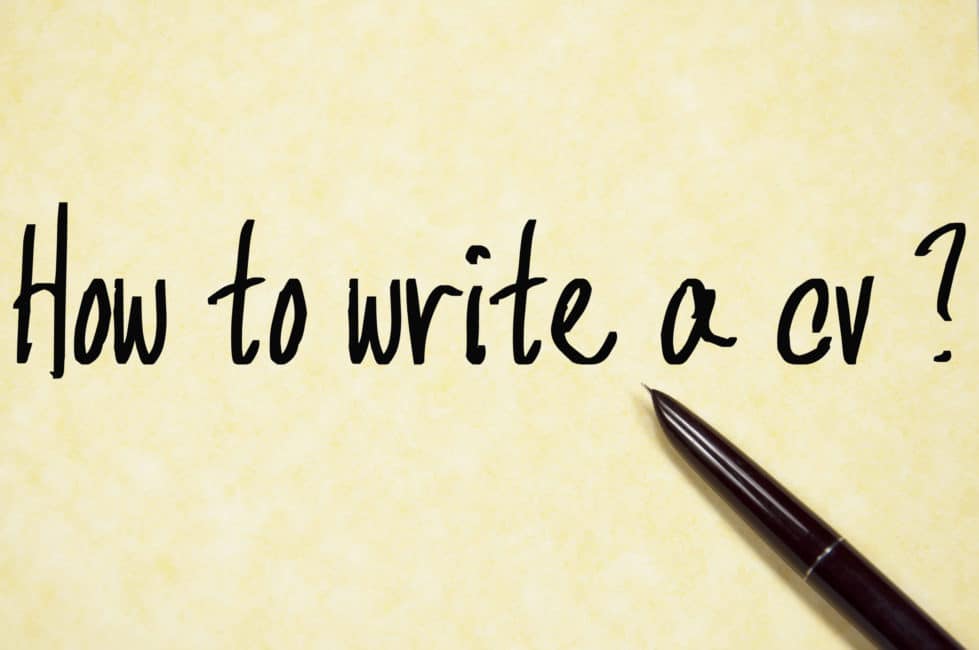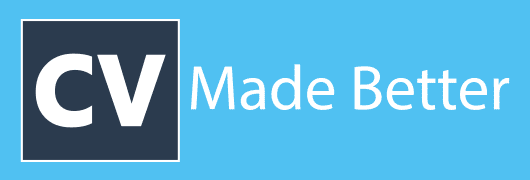How To Write A CV

How To Write a CV
What is a CV? CV is a shortened version of the Latin phrase “Curriculum Vitae”, meaning “course of life“. It is a document designed to detail and highlight your employment / academic history. A CV typically includes information such as work experience, skills, achievements and awards.
So, do I need a CV or resume? Both documents summarise your professional history, education, skills, achievements, and what you would generally provide when applying for a job. Understandably this is where people get confused. A resume typically provides a more concise overview of your previous roles, skills and details about your qualification/education. The French word résumé translates to “summary.” A CV is widely accepted as a more detailed document that covers the whole course of your career.
The words CV and resume regularly interchange within employment / recruitment advertising. A CV and resume are similar in that both are documents that summarise your professional history, education, skills and achievements. Both are also documents you would provide an employer when applying for a job. As a result, it’s often ok to submit a resume when the job description asks for a CV or vice versa. However, when applying for roles in the United States and most of Europe, resumes and CVs are not interchangeable. So tailor your application style accordingly.
Pick your CV format
Chronological CV Format
The chronological CV format is the most commonly known and the one people are most used to seeing. Your jobs are listed in chronological order using this format, starting with the most recent job first. Dates of each position are included, and it generally consists of an objective statement, career profile and sections such as skills/attributes, education, and achievements.
Functional CV Format
A functional CV is recommended for people with work history gaps or out of work for a while. Skills, attributes and accomplishments are prominently featured. A career objective and educational qualifications are listed. However, the actual jobs do not include dates. The career history section will be limited to a list of company names, job titles and locations. An advantage of this CV format is that it effectively reduces the number of pages an employer needs to read and makes an application more impactful. The disadvantage is that recruiters don’t like it. They get suspicious about a CV if no dates are included and may reject it if it raises too many questions.
Combination CV Format
The combination CV combines the best of both the chronological and functional CV formats. Essentially, it’s a chronological CV with key skills or a core competencies section at the top. A functional CV format is followed but includes the dates of employment. This format is perfect for emphasising your key skills and particularly useful when considering career change by effectively showing the value you can bring.
What to include in a CV
Contact Information – Include your full name (no need to include middle name), Location (city / country is fine), contact numbers, email address and LinkedIn URL. Do not include your date of birth is irrelevant or unless required, a photo.
Objective Statement – Add a powerful but concise opening one-sentence statement. It should briefly summarise relevant qualifications, skills and experience specific to the industry / role applying for.
Career Objective / Summary – A CV profile highlights your key attributes and helps your application stand out. Place at the beginning of the CV focusing on industry-relevant achievements and skills. The profile should be no more than 100 words using 4 / 5 concise sentences.
Education – List all your previous education, including professional qualifications or certifications. Order with the most recent first. Include the qualification type, grades, and dates. On listing higher education, like degrees, only mention specific modules or topics when relevant. Depending upon the length of your career to date, this section can go near the end of the CV.
Employment / Career History – List your employment history in chronological date order. Include the job title, company name, how long you worked for the organisation, key responsibilities/ duties, and relevant achievements.
Skills and Achievements – Key skills listed on your CV should be relevant to the job you are applying for. When listing achievements, do not exaggerate your abilities, as you may be required to validate them as part of an interview process.
References – Most jobs will not require you to provide the names of referees at the application stage. You can put ‘references are available upon request’, but leave this out if you’re stuck for space.
Add your Contact info right to your CV
The contact information for your CV should sit at the very top. Your full name is effectively the document title. Use a large, bold font so that it is prominent. Be aware that the word ‘CV’ or ‘curriculum vitae’ should not appear on the document at all.
Contact details should be placed near your name in a smaller font. Where they sit on the page is up to you however, the combination of your name and contact details should be a separate section from your personal profile.
When happy with the format and level of detail, check your contact information thoroughly. A small error in your email or phone number could prevent you from being contacted and landing a job interview.
CV Summary / Objective
This CV Summary / Objection section is placed at the start of the CV to introduce you to the employer. It is the place to convince an employer that you’re the most suitable applicant for the position. Poorly written statements will take away a potential job opportunity. Include related information from your CV to demonstrate your skills, abilities, strengths and qualifications.
The primary focus is to increase your chances of getting positive responses and encourage the employer to read the CV further. When written effectively, it can also make a lasting impact on the employer. Keep in mind the position requirements and design your objective accordingly. Take the time to learn the skills and qualifications required for this position. See whether you meet them. Knowing these basic requirements of any job will make designing an effective objective a lot easier. In the CV, state your goals, how you will achieve them, and how the company would benefit.
Personal Profile
A personal profile highlights your current situation, skills and experience. The main difference between that and a career objective is it also includes the type of employment you seek. Both personal profiles / career objectives are focused, with short paragraphs at the beginning of a CV.
CV Employment and Career History
A Career or Employment history is a detailed summary of your past experience. Essentially an in-depth list of all jobs you’ve previously held. Depending on your career history, you can include full-time positions, part-time jobs, temporary / contract roles, internships or voluntary positions.
List key information such as companies name, location, job title, positions held, responsibilities and dates of employment. Most importantly, it should highlight your main achievements and provide specific examples. Start with your current position or most recent job and continue backwards from there. The description should include the following information responsibilities, achievements, awards, and promotions.
The employment history section can be the most difficult to write. Stemming from the large amounts of information you have to include. Your troubles may only appear once you finish writing it. Is your work experience section too short? Is it too long? Does it include the correct information? Below is how you can exclude some common errors.
Don’t include a job description – Employers generally know what the job entails. Instead of listing a list of duties, tell potential employers what positive results you brought to the role.
Tailor the CV to a specific industry / position. Your accomplishments / skills need to match the position your applying for or, at the very least, the industry. One of the greatest ways to get invited to interview is to tailor your CV. Do your research and ensure your bullet points show the type of experience they are seeking.
CV Keywords. Particularly something to be conscious of with the use of ATS (applicant tracking systems) by employers. Read the job description and pick the most important keywords. These words or phrases employers identify as requirements for a specific position. ATS keywords include words that identify qualified candidates based on education, skills, experience, or industry or position. Inserting these into your CV will help you get it past applicant tracking systems and into the hiring managers hands.
Quantify your previous achievements. A manager loves measurable results. A single number is often worth more than a thousand words. Don’t say you “Grew the company’s output a lot”. Instead, don’t be afraid to boast a little with “increased the company’s output by 25%.”
Use concise bullet points. The bullet point style helps structure your CV sub-sections. This is particularly effective used in combination with short paragraphs. Firstly describe your overarching responsibilities, then utilise bullet points to list your major contributions for each position. Depending upon the number of jobs, look to list 4 -6 bullet points for each one.
Avoid cliches / Buzzwords. Some phrases have been overused so much in CV’s they became meaningless and makes the reader cringe. Avoid phrases such as “thinking outside the box,” “creative,” or “problem solver.” These words always sound insincere where you are looking to inspire confidence.
Use action verbs. As opposed to buzzwords, there are some power words you want to use. These include expressions such as “achieved,” “advised,” “negotiated”, and others. As opposed to adjectives, use verbs you can back up with evidence.
CV Education / Qualifications
The positioning of the Education section on your CV is very much dependent on how relevant it is or enhances your job application. Regardless of whether you have a wealth or lack of qualifications, the following tips will help level the playing field against other applicants.
Positioning
If your education / qualifications are your strongest selling point, your Education section needs to follow your CV Personal Statement / Summary for maximum impact. If you’re a recent graduate, this is particularly the case, especially when graduating from a highly regarded university with excellent academic results or professional qualifications are an application pre-requisite. However, suppose your professional work experience is stronger or more relevant than education. In that case, it is advisable to place the ‘Education’ section after your ‘Employment History’ where you highlight experience, achievements, and skills gained relevant to your application.
What to Include
Keep the job and target audience in mind. Look to expand on any areas of your education that will complement your application. List information on relevant modules, subjects, projects, dissertations that demonstrate your capability of job suitability.
Do not include excessive information. Work experience needs to be quantified by various achievements, whereas education can be summarised with grades achieved. Many employers still insist that applicants possess qualifications such as a university degree, but many consider experience, skills, and professional expertise equally valuable assets and overlook educational shortcomings. Do not lie about your qualifications if you don’t meet the stated requirements. Employers can quickly check.
Skills For a CV
CV soft skills
CV soft skills on your can be of as much interest to a hiring manager as your technical ones. Savvy managers know an experienced, highly trained new employee who doesn’t fit into the office culture, communicates poorly with clients and colleagues, or even freezes under pressure can be more trouble than their worth. Unsure which soft skills to list? Review position duties and determine which of your strengths could help you succeed at the job and work setting.
Consider these 10 soft skills and why an employer values them so much:
- Collaboration — Working well with others, both within your team and across different parts of a business is critical to career success. Give examples of how you collaborated in your CV work history that demonstrate successful teamwork and partnerships.
- Adaptability — Whether you’re a new employee learning the ropes, an established staff member adjusting to changing company priorities, or a manager implementing new work practices, you will face ongoing disruption. Companies want employees who can quickly adapt to different environments and are open to new processes and technologies.
- Communication — No matter the industry or position, verbal, writing and presentation skills are essential workplace soft skills. Employers want candidates who can interact with different audiences, be that junior staff intern to executives and can present confidentially
- Creativity — A company grows with an infusion of fresh ideas and new approaches to existing problems. Hiring managers will often give a second look at someone whose CV skills show they can think creatively and offer outside the box ideas / solutions.
- Decision making — Smart managers want to give staff a degree of autonomy as they know it can improve employee happiness / performance and allow them to concentrate on the bigger picture. As such, they value an employee who can assess a situation and determine what next steps to take, rather than continually ask for help.
- Empathy — Understanding the emotional needs of others is vital if you want to engage effectively with managers, direct reports, co-workers, customers or clients. Be it a senior leadership or staff-level role. The ability to put yourself in someone else’s shoes is an invaluable skill.
- Leadership — Even when not recruiting for a managerial role, employers look for those who can inspire and motivate team members, act with integrity, show fairness, and possess a strategic thought process. Highlight professional skills and experience on your CV that shows you can lead.
- Problem-solving — What job doesn’t present challenges or problems? No employer wants to hand hold staff when they come up. An ability to resolve conflict and find creative solutions to challenges, big or small, are prized skills on a CV.
- Positivity — This doesn’t mean being excessively cheerful or optimistic. Instead to show you approach problems with a can-do rather than can not do attitude. Employers do not want a negative mindset.
- Work ethic — Honesty, timekeeping, responsibility and dependability are integral to a strong work ethic. Demonstrate those qualities in the examples you have given throughout your professional history and CV skills sections.
CV Technical or hard skills
When listing technical / hard skills on your CV, include specific skills and certifications. Web developers, for example, would report their proficiency in HTML, SEO and JavaScript. An Accountant, meanwhile, might claim a strong foundation in SAP, Xero or invoicing, and an administrators CV skills could advertise Word or typing certifications.
Here are some Technical / Hard skills for 10 in-demand industries
- Data Analysis — Companies need employees able to gather and interpret technical data from a variety of sources. Technical skills in this area range from a good knowledge of relational database practice and theory to strong being able to extract information from complex documentation.
- Process Automation — Businesses are able to save resources and improve accuracy by utilising smart software and AI to complete tasks. Companies rely on humans to set up the processes whilst overseeing the systems. Highlighting your experience in this area or completing relevant certification programs can instantly make you more appealing to an employer.
- Enterprise Resource Planning — ERP systems like SAP, NetSuite, and Oracle assist companies in managing their businesses and automating essential functions. Professionals in this area need to promote expertise in coding and project management.
- Human Resources — HR specialists assess and recruit job candidates, onboard new employees, and develop staff retention efforts. HR professionals can also look after employee engagement, produce wellness programmes and lead training / team-building. If this is your area, promote strong communication and project management skills on your CV.
- Data privacy — Cybersecurity is a top priority for any organisation that handles sensitive or proprietary client information. Specific in-demand certifications / skills will depend on the job and industry but could include CompTIA.
- Maths — Not just Accounting requires workers to work out percentages, calculate profit margins or create data charts. A marketing professional or copy editor, for example, will work with results from a survey occasionally.
- Project management — In your CV’s work history and skills sections, display knowledge of the software and best practices to see a project from inception to completion. The Project Manager Professional [PMP] certification, offered by the Project Management Institute, ITIL or Prince 2, are examples of what an employer will be looking for.
- Software Expertise — Almost every office job requires basic knowledge of Microsoft Office or G Suite apps for tasks such as word processing, spreadsheets creations, email, or presentations. Many roles require a good understanding of IT. A technology job is an obvious example, but many other industries and jobs value tech proficiency. For instance the legal field: 62% of lawyers said in an industry survey that their recruiting decisions are influenced more by the candidates’ technical abilities than soft skills.
- Multilingual — The more customers and clients you can work with, the greater your value to an employer. Highly desirable second languages depend on the industry and location, but Chinese, Arabic, Spanish, French and German are always in demand. Even if applying for a job not requiring interaction with international clients, fluency in another language is an asset to list on your CV.
- Typing skills — Medical coders, schedulers, secretaries, data entry personnel and administrators need fast and accurate keyboard skills. How fast is fast? That depends on the industry and job, but the job description will give you an idea. Your speed and accuracy can be checked via one of the many free typing speed test websites. For consistency, check them via a couple of sites.
Cover Letter
Do you need to include a cover letter with your CV? Simply yes, you should include a cover letter with your CV even if not required or asked for. There are only a few exceptions you might not need a cover letter. One is applying online, where some applicant tracking systems (ATS) don’t enable candidates to submit them. If that’s the case, don’t be concerned. In all other instances, submit a Cover letter.
CV Do’s and Don’ts
Finally, some Do’s and Don’ts to consider when writing your CV.
DON’T
Over embellish or Exaggerate the Truth – Lying or over embellishing / exaggerating your CV is never a bright idea. Don’t start a professional relationship based on misrepresentation of facts. As you would hope the employer is not lying about the job requirements, salary, they expect the same from you about your experience or skill sets. Should you be caught out later, this could lead to instant dismissal.
Put picture on your CV – Unless in a professional dependent on physical attributes, do not put your picture on the CV. Any application should be based solely on experience or credentials for the role. An image opens up the possibilities of discrimination or a decision to not interview based exclusively on the way you look.
Limit Yourself to One Page – A common myth is that a CV / Resume must be one page only. A one-page CV usually means limited detail, tiny font and no spacing. When viewed on screen, this is not attractive and hard to read. If necessary, two or three pages is also absolutely fine to encapsulate information in your application.
Rely on CV Templates or Sample Resumes – When considering a good CV sample or template to use as a guideline for your CV, ensure it is appropriate considering your background, the industry you’re targeting and career aspirations. Different CV styles suit different industries. A Project Managers CV will differ significantly from that of a Sous chef. They both have unique skill sets that need to be highlighted in different ways to be effective. Also, when considering a template, avoid those with lots of graphics or images. They may look nice but don’t work well with Applicant Tracking Systems and ultimately never end up with the hiring manager or recruiter.
DO
Use short and meaningful bullet points – When detailing your experiences and skills use bullet points to outline your accomplishments. With tens of applications to consider hiring managers will skim read your CV (certainly on the first pass). Bullet points are great for drawing attention to important information and are much easier to read and even easier to skim read. They are visually attractive and make the information more accessible to the reader. Another option could be a short paragraph explaining duties and responsibilities, followed by bullet points highlighting notable achievements. This is acceptable, just keep the section very succinct and avoid any redundancies.
Have a Strong Objective Statement – A powerful and concise opening statement goes a long way in ensuring the hiring manager decides to keep reading. Straight away, it tells them the job you are applying for and should effectively but briefly summarise relevant qualifications, skills and experience. Now we are only talking about one sentence. Aim to grab their attention, establish your professional brand and show your value. Don’t give the reader too much to consider rather, they proceed on and read the rest of your CV.
Cut to the Chase – Most recruiters will skim, read or scan over a CV looking for specific information or experience. Employment history is the most vital piece of information they want to see. Always highlight your experience front and centre. It should start on the CV’s first page. This section will list your past employers, the years you worked for them, your job title, and a description of duties / achievements. Should your experience be heavily dependent on your academic success, then include this before any employment details.
Focus Your CV – An unfocused CV, especially in the times of ATS (Applicant Tracking systems), is a mistake. It is impossible to have a CV that will match every vacancy but keep in mind that a modified CV for a specific position type is more effective than a generalised and vague CV. If you’re serious about the job, take some extra time to tailor a CV to the set requirements. Your efforts will improve your chance of gaining an interview and ultimately getting the job.
CV Spelling / Grammar – Simple spelling/grammar mistakes can undermine your CV’s creditability. Check and double-check before sending. Tools like Grammarly can also help you be more articulate. Most hiring managers will consider it a plus if you can convey a level of intelligence in your written communications. Don’t be afraid to break out the big words, and always run your text through a spell check. When writing the CV for your current job, use the present tense. For previous positions, use past tense.
If you need help regarding a new position, don’t hesitate to reach out to us. Take a look at our services below.



